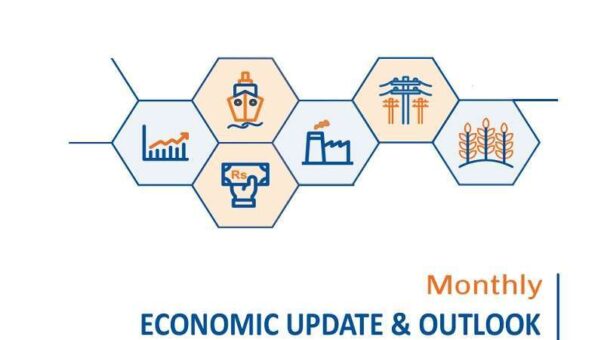Islamabad, February 29, 2024 – Pakistan’s Gross Domestic Product (GDP) has bounced back into positive territory, registering a growth of 2.1% in the first quarter of the fiscal year 2023-24, according to a report released by the Ministry of Finance on Thursday.
This marks a significant turnaround after two consecutive quarters of negative growth, signaling positive economic momentum.
The monthly Economic Update and Outlook for February 2024 highlighted that stabilization measures, encouraging business confidence, and exchange rate stability contributed to the positive economic outlook for Pakistan amidst ongoing challenges. The recent months have seen the restoration of market confidence, leading to an upswing in economic activity.
The growth in GDP was broad-based, with the agriculture sector posting a remarkable 5% growth and manufacturing activity registering a solid 2.5% growth. The removal of import bans and other restrictions has eased supply constraints, contributing to the overall economic recovery. Data from the second quarter of FY2024 indicates a stronger performance in the manufacturing sector, with large-scale manufacturing posting an 8.2% increase over Q1.
The report predicts that Q2 FY2024 GDP growth will rise to around 3%, driven by stronger manufacturing output and increased production of crops, including a notable 75% increase in cotton production to 8.35 million bales.
The caretaker government has implemented measures to reduce unproductive expenditures and boost tax and non-tax income. During Jul-Dec FY2024, the government achieved a primary surplus of Rs 1.5 trillion (1.4% of GDP), surpassing the International Monetary Fund (IMF) Standby Agreement (SBA) target of 0.5% of GDP.
The report acknowledged difficult and unpopular measures, including a reduction in the subsidy bill on power and gas through timely implementation of quarterly tariffs, as contributing factors to the improved primary account. No supplementary grants were issued during this period, and Public Sector Development Program (PSDP) projects falling under provincial jurisdiction were transferred to provincial Annual Development Plans (ADPs). Simultaneously, funds were increased for 9.3 million vulnerable households.
On the revenue side, the Federal Board of Revenue (FBR) Tax collection grew by 30% to Rs 5.15 trillion during July-January FY2024, despite a slowdown in imports and a 0% Goods and Services Tax (GST) on petroleum products. Overall growth in domestic taxes increased by 40%, driven by a rebound in economic activity and the rise in profitability of various sectors, including Banks, Oil & Gas, and manufacturing.
Import taxes posted a growth of 16%, with improvements in import valuations yielding Rs 151 billion in collections. The anti-smuggling drive also contributed to an impressive 69% growth in FY2024.
The improvement in the fiscal position has resulted in a reduction in the accumulation of public debt. Net domestic borrowing decreased by 67% to Rs 1.9 trillion, and the domestic debt profile improved to 3.1 years in Jan 2024, from 2.7 months in Jun 2023. The government successfully launched a 1-year Sukuk on the Pakistan Stock Exchange (PSX), raising lower-cost debt from non-bank and retail investors.
External net borrowing fell to $0.3 billion, compared to $3 billion in the preceding period. The economic challenges facing Pakistan, particularly the unsustainable public debt position, have been addressed through successful negotiations with the IMF. The first review of the IMF SBA in November 2023 led to the disbursement of $700 million in January 2024.
To sustain these positive gains, the report emphasizes the importance of completing the last review of the IMF SBA by the new government. It suggests reaching an early agreement with the IMF staff on a new medium-term facility to provide an anchor for necessary reforms. Critical reforms on restructuring the Federal Board of Revenue (FBR), privatizing loss-making State-Owned Enterprises (SOEs), including PIA, and implementing the SOE policy for improved governance and financial performance are highlighted as crucial steps for continued economic progress.
